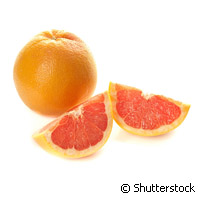Bitter taste of grapefruit could offer sweet relief for diabetics
EU-funded scientists have discovered that the antioxidant naringenin derived from the bitter flavour of grapefruits and other citrus fruits could potentially help diabetes sufferers. They claim it may cause the liver to break down fat while increasing insulin sensitivity. EU support for the research, presented in the journal Public Library of Science (PLoS) ONE, came from the TMIHCV ('Microfabrication-Based rational design of transcriptional-metabolic intervention for the treatment of Hepatitis C virus (HCV) infection') project, which received just under EUR 2 million from the Ideas Programme of the Seventh Framework Programme (FP7). Researchers from Hebrew University of Jerusalem in Israel and Massachusetts General Hospital (MGH) in the US found that naringenin activates a family of small proteins, called nuclear receptors, which cause the liver to break down fatty acids and seemingly mimic the actions of drugs, such as the lipid-lowering Fenofibrate and the anti-diabetic Rosiglitazone. They admitted that the results of the study need to be extended to human patients, but insisted that if similar results arose, naringenin as a dietary supplement could become a staple in the treatment of hyperlipidemia, type 2 diabetes, and perhaps metabolic syndrome. 'It is a fascinating find,' said Dr Yaakov Nahmias from Hebrew University and the paper's senior author. 'We show the mechanism by which naringenin increases two important pharmaceutical targets, PPAR-alpha and PPAR-gamma, while blocking a third, LXR-alpha. He added that 'the results are similar to those induced by long periods of fasting'. The liver is the main organ responsible for the regulation of carbohydrate and lipid levels in the blood. After a meal, the blood is flushed with sugars that activate LXR-alpha, causing the liver to create fatty acids for long-term storage. During fasting, the process is reversed; fatty acids are released by fat cells, activating PPAR-alpha in the liver and are then broken down to ketones (soluble compounds). A similar process, involving PPAR-gamma, increases sensitivity to insulin. 'It is a process which is similar to the [low-carbohydrate] Atkins diet, without many of the side effects,' explained Dr Martin L. Yarmush, Director of the MGH's Center for Engineering in Medicine and one of the paper's authors. 'Dual PPAR-alpha and PPAR-gamma agonists, like naringenin, were long sought after by the pharmaceutical industry, but their development was plagued by safety concerns,' said Dr Nahmias. 'Remarkably naringenin is a dietary supplement with a clear safety record. Evidence suggests it might actually protect the liver from damage.' The discovery is particularly interesting given the surging costs associated with metabolic conditions such as insulin resistance that may be partly attributable to Western-style diets. According to the researchers, such illnesses are associated with medical expenditures and lost productivity totalling over USD 130 billion (EUR 103 billion) annually in the US, while cardiovascular care is estimated by the American Heart Association (AHA) to rise above USD 500 billion (EUR 395 billion) this year. Costs are similarly elevated in the EU. The British Heart Foundation, for example, estimates that coronary heart disease, one of the main components of cardiovascular disease, costs the UK healthcare system around GBP 3.2 billion (EUR 3.9 billion) a year and costs the economy an extra GBP 5.8 billion (EUR 7.1 billion) because of days lost due to death, illness and informal care of people with the disease. Drugs or dietary supplements that could potentially reduce insulin dependence and regulate dyslipidemia could therefore have a dramatic effect on healthcare expenditures and public health. 'The potential of using a naturally occurring dietary supplement to regulate lipid metabolism is appealing as this by-product of the grapefruit juice industry is non-toxic, cheap, and has demonstrated anti-inflammatory properties,' concluded the researchers. However, Dr Iain Frame, Director of Research for Diabetes UK, warned that while these results were 'a step forward in this research area...eating large amounts of grapefruit will [not] be a magic bullet [for diabetes sufferers]'.
Countries
Israel, United States



